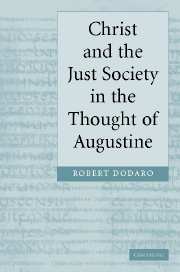Book contents
- Frontmatter
- Contents
- Acknowledgements
- List of abbreviations
- Introduction
- 1 Eloquence and virtue in Cicero's statesman
- 2 Justice and the limits of the soul
- 3 Christ and the formation of the just society
- 4 Divine eloquence and virtue in the scriptures
- 5 Wisdom's hidden reasons
- 6 Eloquence and virtue in Augustine's statesman
- General conclusion
- Select bibliography
- Index of references to Augustine's works
- Index of persons and subjects
4 - Divine eloquence and virtue in the scriptures
Published online by Cambridge University Press: 22 September 2009
- Frontmatter
- Contents
- Acknowledgements
- List of abbreviations
- Introduction
- 1 Eloquence and virtue in Cicero's statesman
- 2 Justice and the limits of the soul
- 3 Christ and the formation of the just society
- 4 Divine eloquence and virtue in the scriptures
- 5 Wisdom's hidden reasons
- 6 Eloquence and virtue in Augustine's statesman
- General conclusion
- Select bibliography
- Index of references to Augustine's works
- Index of persons and subjects
Summary
In Chapter 1 we observed that Augustine took note of Cicero's emphasis in De re publica on the statesman's use of oratory to establish justice in the Roman commonwealth. It is therefore not surprising that in the City of God Augustine treats the scriptures in parallel fashion as God's oratory. For example, he acknowledges the role of divine pronouncements (eloquia) from the Old Testament in the formation of the Hebrew res publica. Augustine claims that these scriptural passages are fulfilled in the New Testament in relation to the city of God. Finally, he argues that the law which God gave to the Hebrew people commanding that he alone be worshipped (Ex 22:20) is fulfilled in God's ‘city’. It is a law that he says is ‘not obscure’, but is ‘written in Hebrew’ and ‘widely known’, referring to the diffusion of the Old Testament throughout the Roman Empire. As a result of its obedience to this law, he concludes, the city of God, and not Rome, is where justice is found. Augustine's analogy between the scriptures as a divine discourse and the role of political oratory in Roman society offers a starting point for exploring the many complex processes by which he believes that Christ persuades members of his body to act justly.
Information
- Type
- Chapter
- Information
- Christ and the Just Society in the Thought of Augustine , pp. 115 - 146Publisher: Cambridge University PressPrint publication year: 2004
